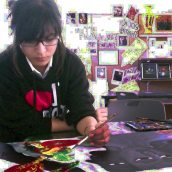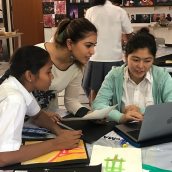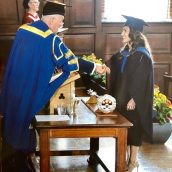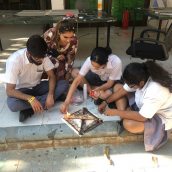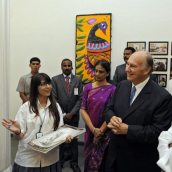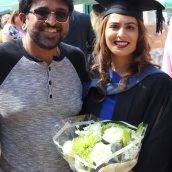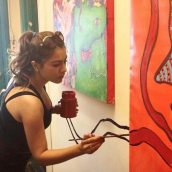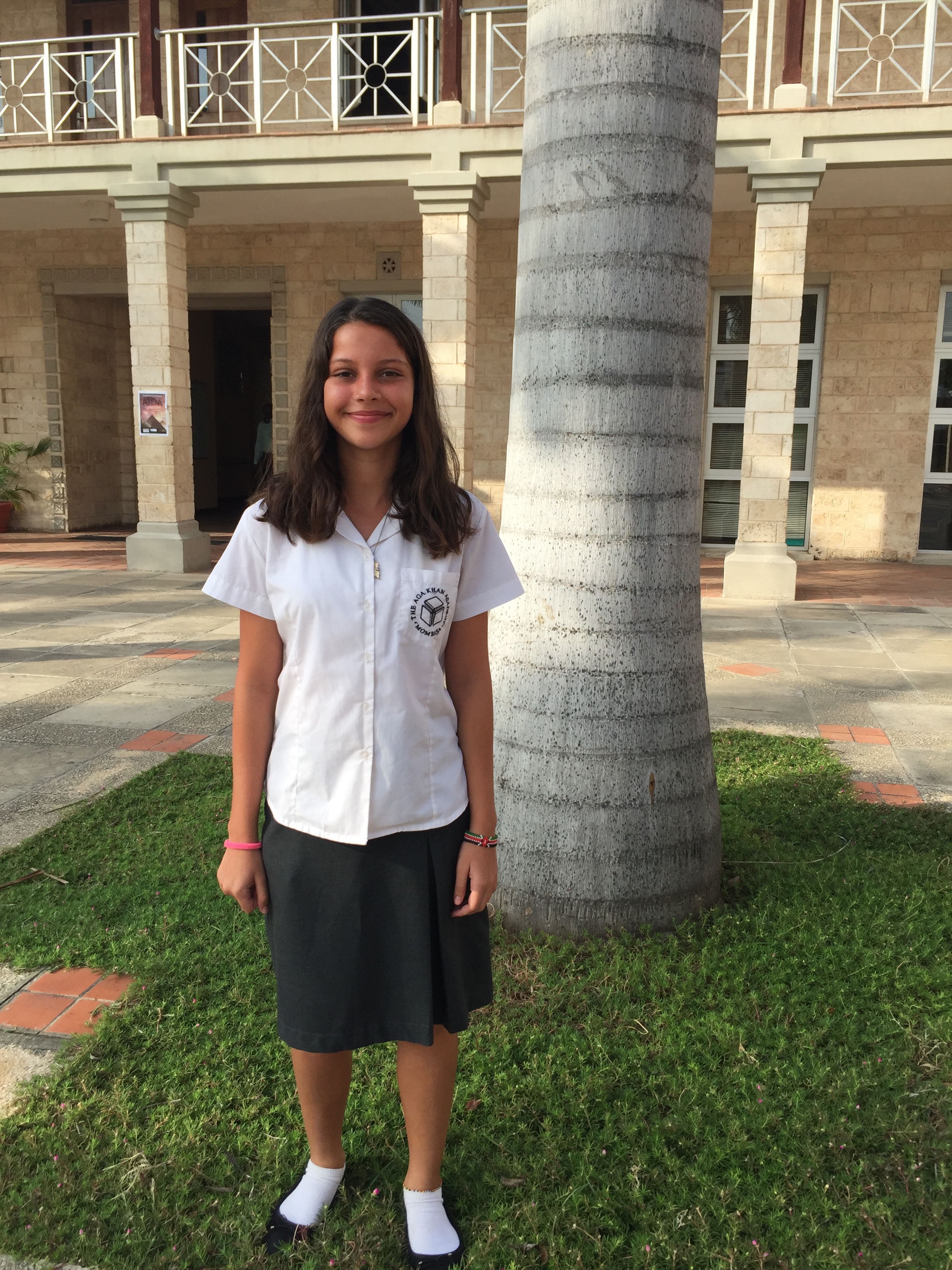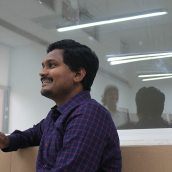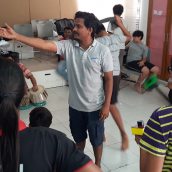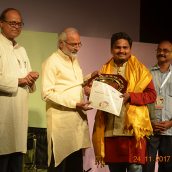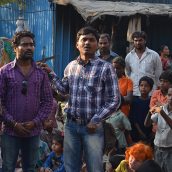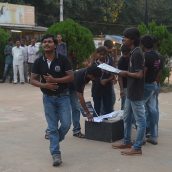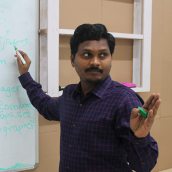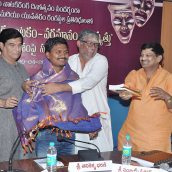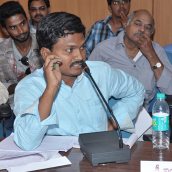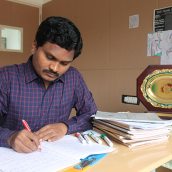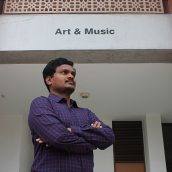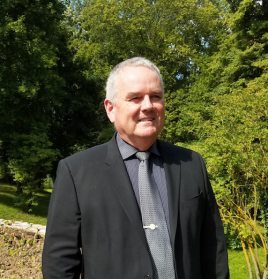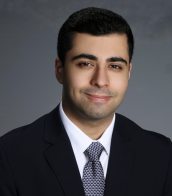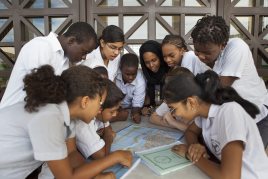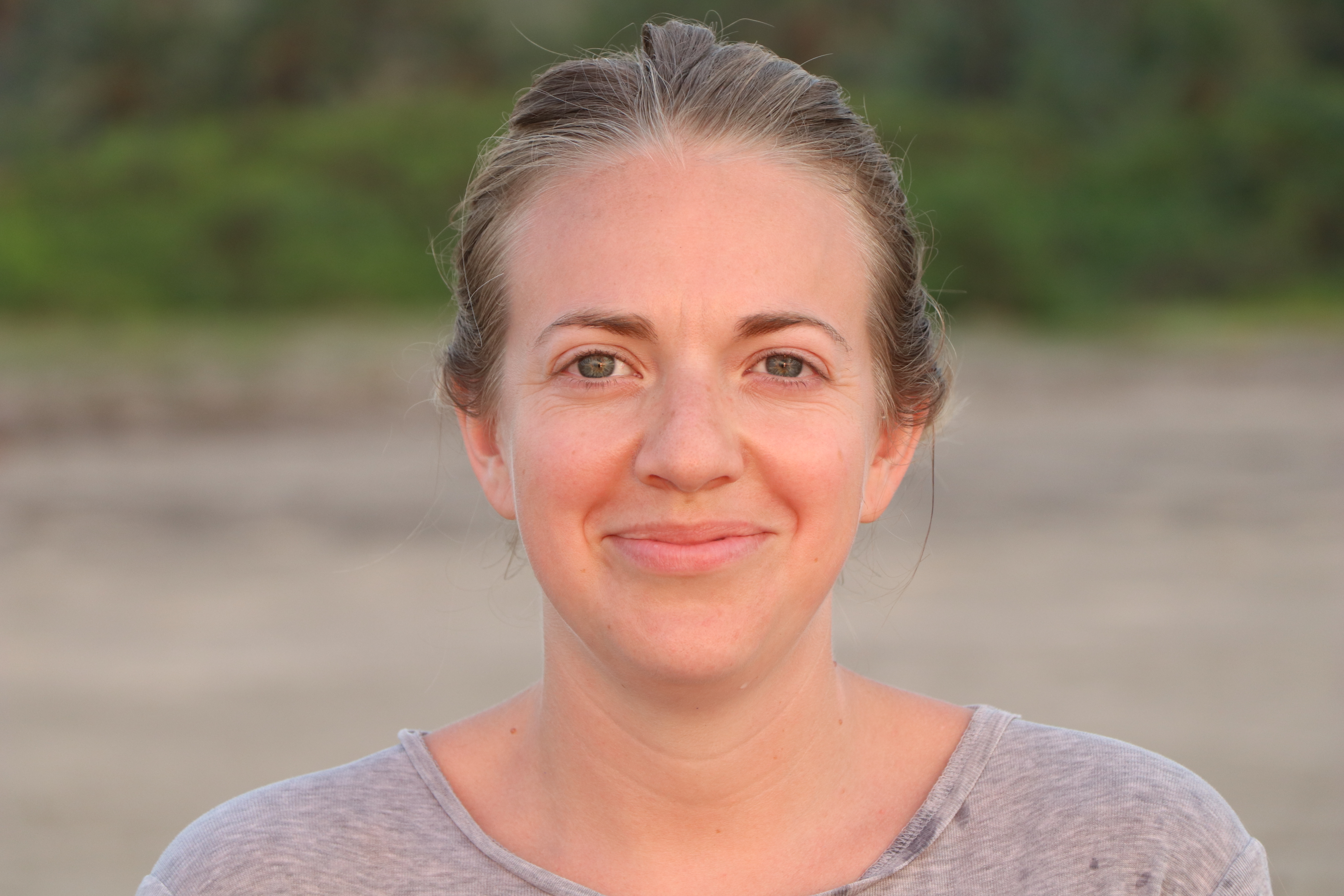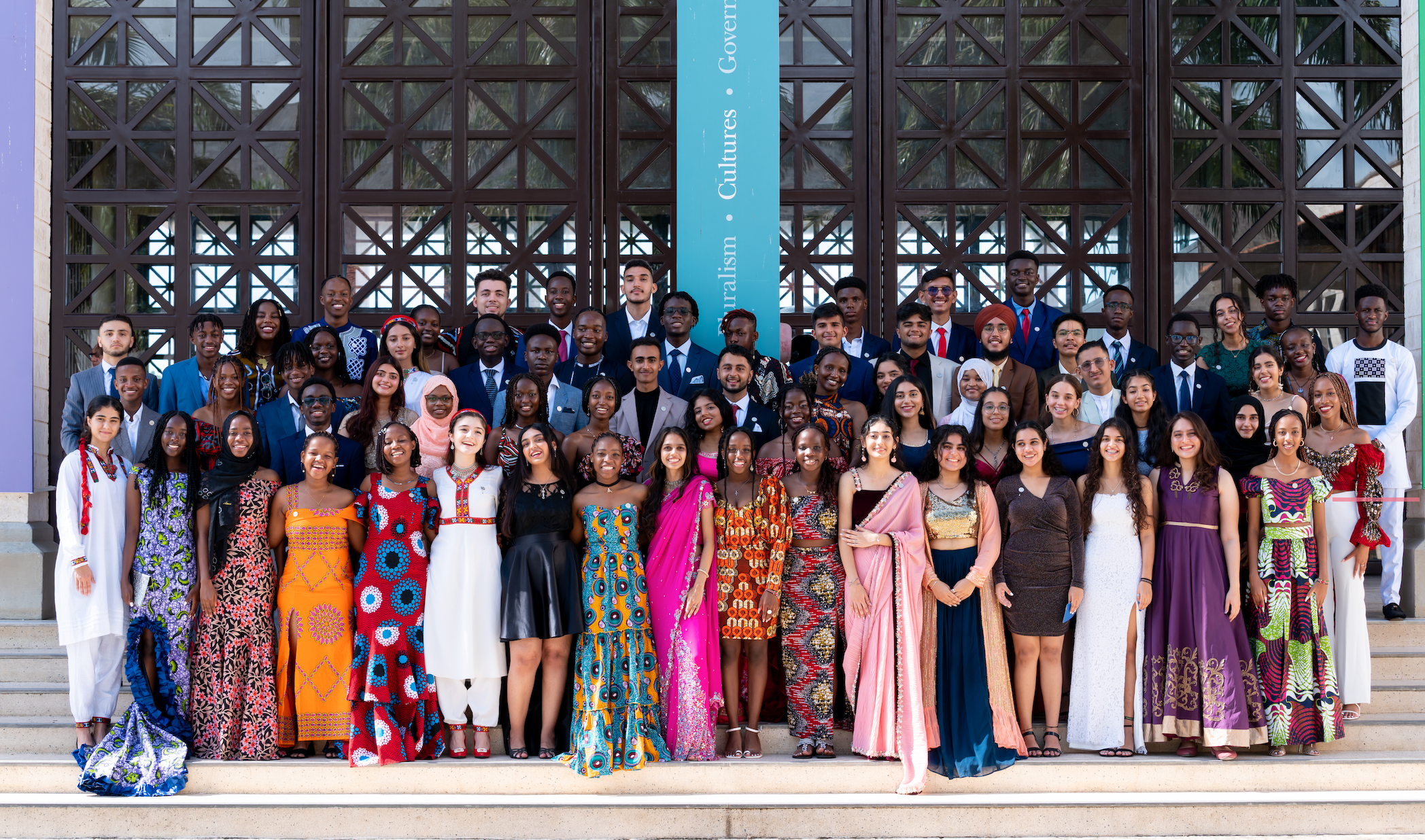At the Aga Khan Academy Mombasa, Ham Serunjogi – CEO and co-founder of African fintech giant Chipper Cash – realised the importance of staying connected to something larger than himself. The Forbes 30 Under 30 honouree is now serving as an advisor to the US President on African diaspora engagement.
Taniya Dharani - alumna returned as visual arts fellow
“The Academy has made me the person I am today,” she says. “I wanted to give back to the Academy what it has given me.” After graduating from the Diploma Programme, Taniya went on to pick up a Bachelor of Arts from the University of Reading, England. In her current role at the Academy, Taniya wants to help visual arts students prepare for university level art courses. It’s also on her agenda to introduce art students to careers in their field that they might not have considered.
“I want to help give our Diploma Programme art students theoretical practice that will be useful at university,” she says. “I also want to help visual art students understand what opportunities the art world outside holds for them; artistic pathways they can opt for including business and law options in sectors that not everyone is aware of.”
Though she has her task laid out in front of her, returning to the Academy in her new role is understandably strange for Taniya. “I still feel like a student at heart,” she says. “But I’ve learnt to act like a teacher and take responsibilities.” Taniya understands that her experience as a student at the Academy puts her in a unique place of understanding in her current role as teacher. “I feel privileged to have the opportunity to see Academy life from a different light this time. Now I understand the day to day challenges teachers face, as well as the hardships of student life.”
Taniya fondly remembers her time as a student at the Academy. When she graduated, Taniya was the only student in the visual arts department. “I really enjoyed visual arts in school. Being the only student, I had the entire art studio and Ms. Meenakshi to myself.” She is referring to Meenakshi Joshi, who is now MYP coordinator in the Senior School. She also remembers history classes with Koel Ray, and service opportunities at old age homes and government schools that taught her humility and empathy.
However, her most cherished memory at the Academy is meeting His Highness the Aga Khan. At the inauguration ceremony of the Academy in 2014, Taniya had the opportunity to show and discuss her art work with HH. “It was the most precious gift that I ever received and a memory that has helped me hold onto my passion.”
In her personal life, Taniya cites her father as her source of inspiration. It is a common trope that parents discourage their children from pursuing a career in the arts, but this wasn’t the case for Taniya. “Despite people not understanding my passion for painting, he [Taniya’s father] always stood by me and helped me achieve my goals,” she says. Taniya is also proud of her father’s efforts in community service and the life he has led. “His struggles and achievements inspire me. It makes me want to do great things.”
“Growing up I realised that the only thing that ignited a fire in me was holding a paintbrush in my hands and dropping paint all over my clothes. It made me feel like all is well in my world, even when almost everything in life was falling apart.” Taniya is in some ways a time capsule from the Academy’s early years, and like a time capsule, she reminds us of things that have changed, and also about the things that have remained the same.
Written by Ajay Sundaram
Chandrasekhar Indla - Holding the baton of Telugu theatre
 All the world's a stage, Shakespeare famously wrote, and all the men and women merely players. Chandrasekhar Indla, drama faculty at the Academy’s theatre arts department, would take a dim view of such a simplistic description of a stage play. As director, lighting designer, sound technician, mask-maker and writer, Chandra has been a part of hundreds of performances and, talking to him, you would believe that the stage is possibly more than the world, and players perhaps more than merely men and women. “Drama is an important instrument that can build a sense of consciousness in society,” he shares. “There is a need to save and reinvent drama.” For over five years now, he has dedicated his career to introducing children to the world of theatre arts.
All the world's a stage, Shakespeare famously wrote, and all the men and women merely players. Chandrasekhar Indla, drama faculty at the Academy’s theatre arts department, would take a dim view of such a simplistic description of a stage play. As director, lighting designer, sound technician, mask-maker and writer, Chandra has been a part of hundreds of performances and, talking to him, you would believe that the stage is possibly more than the world, and players perhaps more than merely men and women. “Drama is an important instrument that can build a sense of consciousness in society,” he shares. “There is a need to save and reinvent drama.” For over five years now, he has dedicated his career to introducing children to the world of theatre arts.
A prolific academic, Chandra was among highest scorers in the National Eligibility Test, an exam held nationwide by the University Grants Commission (UGC) which qualifies people to teach performing arts at a collegiate level. His work since his first tenure as a master’s student at the University of Hyderabad has been about introducing drama to a young audience. He was among the first members of the university’s Theatre Outreach Unit, created to expose children all over the state to theatre arts. He joined the Aga Khan Academy Hyderabad in 2015 to continue in this effort. “Our Academy is one of the best places where the teacher-student relationship is so strong in terms of respecting each other and sharing thoughts,” he says. Chandra, not a technical direcor for drama at the Academy, was very happy to teach at the Academy because the IB curriculum gives theatre arts the importance of a elective, rather than just tacking it on as a co-curricular activity as other school programmes do.
With two master’s degrees and a PhD on the way, Chandra surprisingly admits he wasn’t very good at school. In fact, he even struggled through his first degree, a bachelor’s in computer science. “I don’t remember any programming today,” he confides. Once Chandra relieved himself of his pursuits in technology and began honing in on theatre, his academic performance drastically improved. He finished his master’s in performing arts with a gold medal from the University of Hyderabad, and went on to earn two prestigious research fellowships from the UGC to write about theatre arts. These fellowships sustained him for nearly six years. “My family was happy to find out I was going to pursue theatre arts, because my paternal uncle is an author, and they thought he could help me.”
Chandra was born in Kanduluru in Andhra’s Prakasam district where his parents worked for daily wages, often at construction sites or in the tobacco fields of of the coastal district. “He was into old, traditional theatre arts,” Chandra says of his uncle. “Today I’m in national theatre festivals. I have more contacts than him,” he adds, laughing. Indeed, Chandrasekhar Indla has become a recognisable name in Telugu literary circles. This began when his final master’s project, a play adaptation of the book Gopathrudu by K.N.Y Pathanjali, became a sensation in theatres across Andhra Pradesh (before the creation of Telangana State). He followed this with another adapted play called Miss Meena, based on the tragicomedy The Visit by Friedrich Dürrenmatt. Ms. Meena was performed over a 100 times statewide, earning Chandra a reputation as tested thespian. Apart from this, Chandra has also spoken and presented about Telugu theatre at international conferences.
“As a professional admirer of drama I would like to hand over the future of drama to the students to take it further,” he says. Since his joining the Academy, our students have held performances across the city, attended several festivals and plays, and most notably, entered the Amaravathi National Theatre Festival in 2017. “I had the freedom to run and develop the department,” he says of being the first drama teacher at the school. “I have used this freedom to develop the students’ abilities in acting, communication, confidence, creativity and thinking skills.” With the addition of George Macpherson to the drama department as of August 2018, the programme has only gained in strength. “We’ve built a whole new teaching strategy together,” Chandra says of his friend and colleague George. “As a practioner, I'm more comfortable teaching the the practical aspects of theatre, whereas George is very good at teaching theory."
Inevitably, Chandra went from adapting literature to the stage to creating literature himself. As of date, he has been published in Telugu literary magazines 12 times, and has a collection of short stories on the way. One of the major motifs in Chandra’s writing is social equality and social reform. At the Aga Khan Academy Hyderabad, where pluralism is one of the tenets of the school’s ethos, Chandra is a person students can look up to who shows these values in his work and personal life. Chandra met his wife Ezhilmathi in 2009 when they were doing their master’s of philosophy in performing arts at Pondicherry University. His area of focus was drama while hers was music. “She taught me Tamil,” he says, “I think that’s where it began.” The two had to convince their parents before they could get married. “My marriage is inter-state, inter-faith, inter-caste,” he laughs. In August 2012, Chandrasekhar and Ezhilmathi were married in a wedding with both Hindu and Christian rituals.
“Drama can build self-confidence in a person. However, most people do not have proper understanding or admiration of drama,” Chandra says. Looking out of his office window at an overcast December morning, Chandra’s thoughts about his art turn bleak. “No one reads scripts,” he says of the culture of literature in the subcontinent. “People will just read Shakespeare as a play, but that is not the case for Telugu literature.” The shields and trophies on his desk gleam in the wintry light. “Maybe this culture of drama will die out one day."
Though the thought is dark, Chandra doesn’t let it get in the way of his work, and rather uses it to fuel his work as a teacher. He knows that many of his students will go on to pursue, say, computer science, but that doesn’t deter him. “I want my students to be good humans who are not only responsible but also sensitive to others’ emotions and culture. Drama needs to be handled more as a legacy and its nuances need to be inherited and passed on generation after generation. This is possible only when I take up the role of a teacher.”
Written by Ajay Sundaram
Jonathon Marsh: Supporting the quality of teaching at the Academies
Jonathon Marsh has system-wide responsibility for teacher development at the Aga Khan Academies network. Having worked for the Academies for the past 10 years, he has previously had leadership roles in education in Canada, Hong Kong, the United Arab Emirates and the United Kingdom, including as the Head of Professional Development and Research for the International Baccalaureate. In this interview, he shares the highlights of his position at the Academies, and reflects on how the Academies are unique from other educational institutions.
Tell us the journey that led you to the Academies.
I first came across the AKDN when I was in Hong Kong. I read a recruitment ad in the Times Higher Education magazine seeking people to fill positions at the then recently opened Aga Khan University in Karachi. I remember looking at the ad and experiencing a strong sense of conviction that one day I would work for this organisation. More than a decade later, while working at the IB, I was introduced to Salim Bhatia [Director of Academies] by the then Chair of the IB’s governing council. Salim asked me if I knew anyone that would be interested in taking a lead role in teacher development for the emerging Academies. At the same time, he was in discussion with Monique Conn, who was my line manager at the IB, about the position of Academic Director. Monique accepted the position soon thereafter and persuaded me to join as well.
What is the most rewarding aspect of working for the Aga Khan Academies?
I think the majority of my colleagues would unanimously reply “the students”, and they would be right to do so. However, for me the job is about quality teaching, and having the opportunity to really influence the discourse on teaching and learning in the countries and regions we work within is very exciting. Having a chance to work both at the high end with government ministries, NGOs and universities and at the chalk face with individual teachers, especially young people new to teaching, provides me with a full spectrum of very meaningful and satisfying engagements.
What led you to choose your particular career?
I don’t see it as a career but rather as a vocation. I see the profession of teaching as critically important to the health and ongoing development of any society. As such, I can think of no better way to contribute to the betterment of humanity.
What attracted you to the Academy?
First and foremost, the vision and mission. Especially attractive is His Highness the Aga Khan’s insight into the importance of the profession of teaching and the need to restore its much diminished status in the various geographies within which the Academies are located.
Reflecting on your time at the Academy, is there a particular day that was especially rewarding and memorable?
There are too many to count. Among them perhaps two stand out: 1) the graduation of the first cohort of teacher interns completing the Teacher Preparation Programme (TPP), and 2) becoming the first (and as yet only) school network in the world to offer a teacher development programme recognised under the IB Educator Certificate initiative. The building of the TPP and overcoming the many associated challenges took an extraordinary amount of effort, with contributions coming from many people. Seeing it come to fruition was very gratifying.
How do you think you contribute to the inner workings of the Academies and to the achievement of its goals?
I work collegially with the Heads and senior staff in each Academy to think through and implement systems to support the quality of teaching across the network. This includes working with both external and internal providers to source and implement professional development programmes; liaising with universities and other AKDN agencies to define and conduct research and development projects; providing support for the collection and analysis of standardised data; ongoing development and application of the Academies’ teacher appraisal programme; specifying career pathways for teachers; and contributing to the specification of the Academies outreach strategy.
What sort of positive impact have the Academies had on you?
I have gained a great deal of knowledge and understanding around what it takes to start up a high quality school. I have also gained a great deal of insight into the full complexity of running a school. I have always had a great deal of admiration for those brave and committed enough to teach, but my admiration has grown considerably for those who continue to do so under very difficult circumstances.
In what ways has the Academy helped you to become a more effective advocate in the education world?
I am nearing the end of my professional life (I am not really sure what that means other than a euphemism for being over 60), and my role in the Academies has provided me with a unique opportunity to apply much of the knowledge and understanding I have gained over the years. I have drawn upon my background in philosophy and spirituality to better ground my efforts to develop systems within His Highness’s vision for the Academies. I have drawn upon my studies in educational technology to inform system development. My time at the IB has helped me to understand the particular needs of IB teachers and how to support them. The years spent in tertiary education have enabled me to better liaise with universities and support research and data collection. Working with the Academies has allowed me to not only to promote principles of good practice and high quality education, it has provided me with a platform to do so in places that are hungry for change and very much in need of educational reform.
How would you describe the teacher development work with which you engage?
I would describe it as very rewarding precisely because it is very challenging. When it comes to teacher development, we are dealing with many layers of readiness among practitioners. Each country has its own approach to teacher preparation, and within each country not all teachers are given equal standing. For example, senior school teachers are typically better trained and better paid than junior school teachers. Junior school teacher preparation often does not involve gaining a university degree, and only those who could not get into a university opt for junior school teacher training programmes. Convincing people that teaching young children is at least as complex and difficult as teaching older kids is surprisingly difficult. Yet how are we supposed to achieve the kinds of sophisticated learning outcomes envisioned by His Highness if we do not prepare students for them right from the beginning? Building the necessary culture of professional respect for the expertise of all teachers, and indeed helping teachers to define and value their own professional identities is particularly important and very challenging.
What do you think sets the Academies apart from other educational institutions?
The Academies are not unique. There are other schools around the world which share many of the same attributes. However, they do have some very interesting defining characteristics. Firstly, the degree to which they are vision and mission led is compelling for many. Secondly, the commitment they have to provide access to excellent education to talented kids regardless of their ability to pay. Thirdly, their commitment to serve the countries they are in by providing an international standard of education for a majority of local students and employing 80% local teachers. Lastly, their rootedness in the local community and their ability to draw upon the many strengths of the wider AKDN as well as the committed and generous support of the Ismaili community.
How do you think the Academies ensure a climate of pluralism?
The Academies strive to value each child and each member of staff as a unique individual, and expect each to make a unique contribution. A pluralistic perspective is promoted by bringing together individuals from across cultural boundaries, tribal lines, disparate geographic locations, genders, ages, faiths, and economic backgrounds and providing them with a continuous and intensive opportunity to engage with, understand, and come to value each other’s “otherness”.
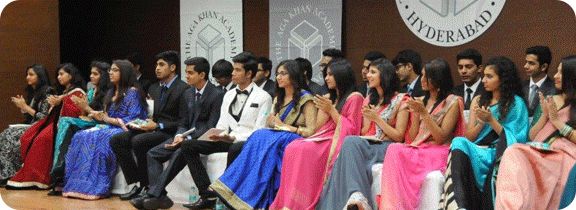
The vision for Aga Khan Academy graduates
Education at its best facilitates positive growth in all domains – intellectual, social, physical, ethical and spiritual – leading to the well-rounded development of the child. The Aga Khan Academies aim toward this ideal, and the values they espouse are reflected in each school’s aspirations for its students.
Students at an Academy pursue a well-balanced education combining intellectual inquiry, academic excellence, sporting and cultural activities, and a grounding in ethics and moral reasoning
They are committed to rigour and self-discipline in their studies and subscribe to the principles of intellectual honesty in the preparation of their work.
They respect their teachers and fellow students. They extend their respect to the cultural, religious and political convictions of others in school and in society. They dedicate themselves to debate issues honestly and fairly. They aim to understand and recognise the value of other views even as they value their own.
They are self-aware and socially conscious. They are committed to the development of their communities, their nation and civil society in the world at large. They are motivated to help others less fortunate than themselves.
They strive to acquire knowledge as part of a balanced, lifelong process of inquiry that leads to intellectual and personal growth, as well as a means to fulfil material goals.
The mastery of a particular discipline is balanced by a broad knowledge of several subjects, including science, art, literature and music.
They are also citizens of the world and at ease in environments and settings other than their own. They are generous and tolerant towards other cultures and traditions.
They are bilingual or multilingual.
They embrace the rich diversity of the world while valuing their own identity.
Read more here.
Interested to know more about our graduates? See spotlights on our alumni
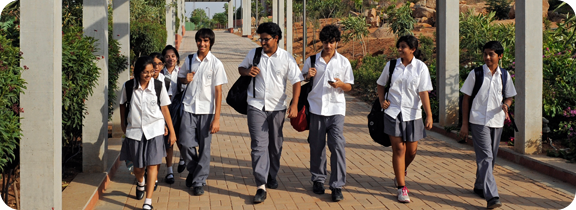
The vision for Aga Khan Academy graduates
Students at an Academy pursue a well-balanced education combining intellectual inquiry, academic excellence, sporting and cultural activities, and a grounding in ethics and moral reasoning.
They are committed to rigour and self-discipline in their studies and subscribe to the principles of intellectual honesty in the preparation of their work.
They respect their teachers and fellow students. They extend their respect to the cultural, religious and political convictions of others in school and in society. They dedicate themselves to debate issues honestly and fairly. They aim to understand and recognise the value of other views even as they value their own.
They are self-aware and socially conscious. They are committed to the development of their communities, their nation and civil society in the world at large. They are motivated to help others less fortunate than themselves.
They strive to acquire knowledge as part of a balanced, lifelong process of inquiry that leads to intellectual and personal growth, as well as a means to fulfil material goals.
The mastery of a particular discipline is balanced by a broad knowledge of several subjects, including science, art, literature and music.
They are also citizens of the world and at ease in environments and settings other than their own. They are generous and tolerant towards other cultures and traditions.
They are bilingual or multilingual.
They embrace the rich diversity of the world while valuing their own identity.
Interested to know more about our graduates? See spotlights on our alumni
Videos
The Aga Khan Academy Maputo is committed to developing future leaders by delivering Excellence in Education. We offer merit-based admission to our International Baccalaureate (IB) programme at our purpose-built world-class campus in Maputo, Mozambique. Watch our newly released video to learn more about our unique offering.
The International Baccalaureate featured the Aga Khan Academies and our approach to creating home-grown leaders as part of their 50th anniversary commemoration. Watch to learn how the Academies work to transform the communities in which they are located.
This is Abdirahman, a student at the Aga Khan Academy Mombasa. During his time at the Academy, he explored his wide-ranging abilities and developed an initiative that helped change the lives of young girls in Mombasa.
Meet Abdalla, a Somali student from the Aga Khan Academy Mombasa. He shares his journey of self-discovery: Abdalla solidified his multiple identities, fostered his strengths, and created positive social change during his years at the Academy.
Women and girls are strong, fearless, courageous, limitless, and powerful. The Aga Khan Academy Hyderabad celebrated International Women's Day on 8 March 2018 with this video.
Video by AFD – Agence Française de Développement about how children at the Aga Khan Academy Maputo "Dare to Dream Big" in their new school facilities. The Aga Khan Academy in Maputo, Mozambique has been growing since it opened its doors in 2013. The second phase extension was completed in early 2018 and included bigger classrooms, extended outdoor play areas, a library, an art room and a science lab.
This is Mercy, a teacher at the Aga Khan Academy Mombasa who joined through the Teacher Preparation Programme. Mercy fosters profound and meaningful relationships with everyone around her and consistently encourages her students to be the best versions of themselves.
Meet Sadiq, a student at the Aga Khan Academy Mombasa. Open-mindedness, confidence and time management are some of the many characteristics he has developed at the Academy that will help him achieve his dream of becoming a journalist.
Meet Saumya, a student at the Aga Khan Academy Mombasa. A musician and a leader, she shares her wisdom on what it means to make a true positive impact.
Introducing Ivy, a student at the Aga Khan Academy Mombasa. Her innate drive for self-growth and desire to give back to the community makes her a true home-grown leader.
Meet Felix, a student at the Aga Khan Academy Mombasa. With a keen early interest in science, he shares his dreams for the future and explains how the Academies have helped foster his ambitions.
This is Stephen, a student at the Aga Khan Academy Mombasa. His passion for community service shines as he expresses the growth in perspective he experienced through his education at the Academy.
A day at the Aga Khan Academy Mombasa's Junior School, seen through the eyes of the students.
Students and teachers from the Aga Khan Academy Hyderabad are featured in this film from the International Baccalaureate about the Middle Years Programme.
This film by the International Baccalaureate highlights the impact being made by students from the Aga Khan Academy Hyderabad through a service initiative at a local government school.
July 2017 video showing progress on the construction of the Aga Khan Academy Maputo's campus.
The aim of the Aga Khan Academies is to develop future leaders with the skills and knowledge to support positive development in their societies. The Academies achieve this by recruiting exceptional young people from all backgrounds and providing them with the highest international standard of education.
The Aga Khan Academies are a global network of schools that produce future leaders who are ethical, effective and pluralistic.
Videos
The Aga Khan Academy Maputo is committed to developing future leaders by delivering Excellence in Education. We offer merit-based admission to our International Baccalaureate (IB) programme at our purpose-built world-class campus in Maputo, Mozambique. Watch our newly released video to learn more about our unique offering.
The International Baccalaureate featured the Aga Khan Academies and our approach to creating home-grown leaders as part of their 50th anniversary commemoration. Watch to learn how the Academies work to transform the communities in which they are located.
This is Abdirahman, a student at the Aga Khan Academy Mombasa. During his time at the Academy, he explored his wide-ranging abilities and developed an initiative that helped change the lives of young girls in Mombasa.
Meet Abdalla, a Somali student from the Aga Khan Academy Mombasa. He shares his journey of self-discovery: Abdalla solidified his multiple identities, fostered his strengths, and created positive social change during his years at the Academy.
Women and girls are strong, fearless, courageous, limitless, and powerful. The Aga Khan Academy Hyderabad celebrated International Women's Day on 8 March 2018 with this video.
Video by AFD – Agence Française de Développement about how children at the Aga Khan Academy Maputo "Dare to Dream Big" in their new school facilities. The Aga Khan Academy in Maputo, Mozambique has been growing since it opened its doors in 2013. The second phase extension was completed in early 2018 and included bigger classrooms, extended outdoor play areas, a library, an art room and a science lab.
This is Mercy, a teacher at the Aga Khan Academy Mombasa who joined through the Teacher Preparation Programme. Mercy fosters profound and meaningful relationships with everyone around her and consistently encourages her students to be the best versions of themselves.
Meet Sadiq, a student at the Aga Khan Academy Mombasa. Open-mindedness, confidence and time management are some of the many characteristics he has developed at the Academy that will help him achieve his dream of becoming a journalist.
Meet Saumya, a student at the Aga Khan Academy Mombasa. A musician and a leader, she shares her wisdom on what it means to make a true positive impact.
Introducing Ivy, a student at the Aga Khan Academy Mombasa. Her innate drive for self-growth and desire to give back to the community makes her a true home-grown leader.
Meet Felix, a student at the Aga Khan Academy Mombasa. With a keen early interest in science, he shares his dreams for the future and explains how the Academies have helped foster his ambitions.
This is Stephen, a student at the Aga Khan Academy Mombasa. His passion for community service shines as he expresses the growth in perspective he experienced through his education at the Academy.
A day at the Aga Khan Academy Mombasa's Junior School, seen through the eyes of the students.
Students and teachers from the Aga Khan Academy Hyderabad are featured in this film from the International Baccalaureate about the Middle Years Programme.
This film by the International Baccalaureate highlights the impact being made by students from the Aga Khan Academy Hyderabad through a service initiative at a local government school.
July 2017 video showing progress on the construction of the Aga Khan Academy Maputo's campus.
The aim of the Aga Khan Academies is to develop future leaders with the skills and knowledge to support positive development in their societies. The Academies achieve this by recruiting exceptional young people from all backgrounds and providing them with the highest international standard of education.
The Aga Khan Academies are a global network of schools that produce future leaders who are ethical, effective and pluralistic.
Alumni
Education at its best facilitates positive growth in all domains – intellectual, social, physical, ethical and spiritual – leading to the well-rounded development of the child. The Aga Khan Academies aim toward this ideal, and the values they espouse are reflected in each school’s aspirations for its students.
The vision for Aga Khan Academy graduates
Students at an Academy pursue a well-balanced education combining intellectual inquiry, academic excellence, sporting and cultural activities, and a grounding in ethics and moral reasoning.
They are committed to rigour and self-discipline in their studies and subscribe to the principles of intellectual honesty in the preparation of their work.
Read more here.
The Aga Khan Academy Alumni Network
Fill out the AKA Alumni online questionnaire here
Connect with us via our Facebook and Instagram pages.
Interested to know more about our graduates? See spotlights on our alumni
